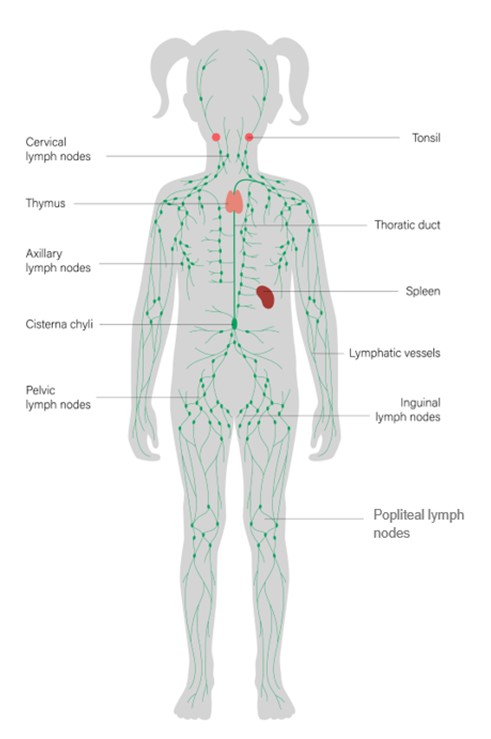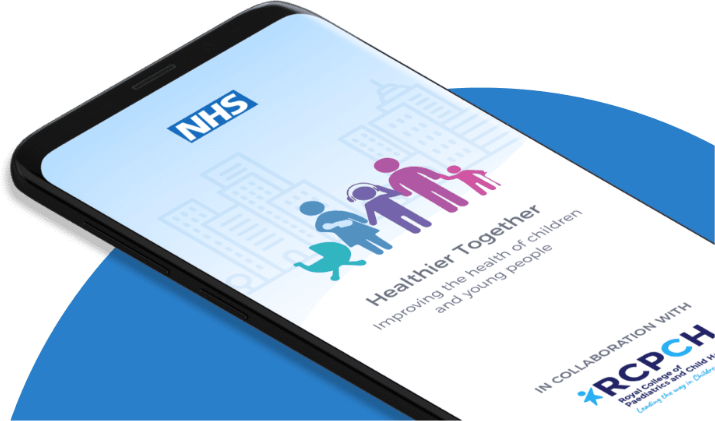Use painkillers such as ibuprofen and paracetamol to keep your child comfortable. Please read and follow the instructions on the medicine packet.
Swollen glands
Swollen glands (also called swollen lymph nodes) are very common in children. They are usually a normal response to infections such as colds, tonsillitis, eczema, or skin infection.
Lymph nodes are a normal part of our immune system, The picture below shows how lymph nodes (glands) are connected by the lymphatic system throughout your child's body.

It is normal for lymph nodes to swell near the site of an infection. Neck (cervical) lymph nodes are the most likely to be affected. If your child has a cold or sore throat then you might notice they have swollen glands in their neck.
Lymph nodes less than 2 centimetres in diameter are unlikely to indicate anything serious. Antibiotics are not normally needed.
Children with eczema sometimes have swollen lymph nodes. They should improve with treatment of your child's eczema.
When should you worry?
If your child has any of the following:
- Is unable to swallow their own saliva
- Breathing very fast, too breathless to talk, eat or drink
- Working hard to breathe, drawing in of the muscles below the ribs, or noisy breathing (grunting)
- Breathing that stops or pauses
- Is pale, blue, mottled or feels unusually cold to touch
- Difficult to wake up, very sleepy or confused
- Weak, high-pitched cry or can’t be settled
- Has a fit (seizure)
- Has a rash that does not go away with pressure (the ‘Glass Test’)
- Is under 3 months old with temperature more than 38°C or under 36°C (unless fever in the 48 hours following vaccinations and no other red or amber features
You need urgent help
Go to the nearest Hospital Emergency (A&E) Department or phone 999
If your child has any of the following:
- Develops pain and redness of the swollen gland
- A swollen gland that is continuously getting bigger, over 2cm
- Swollen glands in lots of different areas of the body
- Swollen glands in an unusual part in the body - e.g. armpit, or near the elbow
- If prescribed antibiotics and the fever has continued for more than 2 days or the gland has not got smaller after 5 days
- Big glands (in the neck more than 2 cm, or in the groin and more than 1 cm), for more than 6 weeks
- Unexplained bruising
- Losing weight
- Night sweats (where your child’s bedding is soaked through in the morning meaning that you need to change the sheets)
- Leg pains or limp
- Household contact with TB
- Breathing a bit faster than normal or working a bit harder to breathe
- Dry skin, lips or tongue
- Not had a wee or wet nappy in last 8 hours
- Poor feeding in babies (less than half of their usual amount)
- Irritable (Unable to settle them with toys, TV, food or hugs even after their fever has come down)
- Is 3 to 6 months old with temperature 39°C or above (unless fever in the 48 hours following vaccinations and no other red or amber features)
- Temperature of 38°C or above for more than 5 days or shivering with fever (rigors)
- Temperature less than 36°C in those over 3 months
- Getting worse and I am still worried
You need to contact a doctor or nurse today
Please call your GP surgery or contact NHS 111 - Go to 111.nhs.uk or call 111.(111 online does not currently take questions about children aged under 5, so if your child is 4 or younger, please call 111).
If symptoms persist for 4 hours or more and you have not been able to speak to either a member of staff from your GP practice or to NHS 111 staff, recheck that your child has not developed any red features.
If none of the above features are present:
- Continues to have enlarged lymph nodes that are slowly improving but they are otherwise healthy
- Small lymph nodes (less than 2cm in the neck, or less than 1cm in the groin) are normal and may persist for years
- Watch them closely for any change and look out for any red or amber symptoms
- Additional advice is also available to young families for coping with crying of well babies – click here
- If your child has a long term condition or disability and you are worried please contact your regular team or follow any plans that they have given you
Self care
Continue providing your child’s care at home. If you are still concerned about your child, call NHS 111 – dial 111
Lymph nodes on both sides of the neck (bilateral) with a sore throat are likely to improve without antibiotics.
Sometimes a large, hot, painful, swollen lymph node may be due to a bacterial infection (bacterial lymphadenitis). This will need antibiotics via the GP / 111.
Very rarely, swollen glands may be a sign of less common infections (like TB) or cancer.
Small nodes in the neck or groin are usually normal.
Your child should start getting better within a couple of days but their lymph nodes may take 2 to 4 weeks to improve.
Small lymph nodes that are less than 2 centimetres in the neck can persist for years, and are rarely of any concern. They do not usually need further investigation, unless there are any amber or red flags as above.
Neck lymph nodes that persist for more than 2 centimetres (or groin lymph nodes more than 1cm) for longer than 6 weeks may need further investigation by a specialist doctor.
Where should you seek help?
- If it is non-urgent, speak to your local pharmacist or health visitor
- If your child has any of the above features, urgently see your GP. For an urgent out-of-hours GP appointment, call NHS 111
- You should only call 999 or go to your nearest Emergency Department (A&E) in critical or life threatening situations
For wear and tear, minor trips and everything in between
Self-care
You can treat your child's very minor illnesses and injuries at home.
Some illnesses can be treated in your own home with support and advice from the services listed when required, using the recommended medicines and getting plenty of rest.
Sound advice
Children can recover from illness quickly but also can become more poorly quickly; it is important to seek further advice if a child's condition gets worse.
For information on common childhood illnesses go to What is wrong with my child?
Pharmacists are experts in many aspects of healthcare and can offer advice on a wide range of long-term conditions and common illnesses such as coughs, colds and stomach upsets. You don’t need an appointment and many have private consultation areas, so they are a good first port of call. Your pharmacist will say if you need further medical attention.
Sound advice
- Visit a pharmacy if your child is ill, but does not need to see a GP
- Remember that if your child's condition gets worse, you should seek further medical advice immediately
- Help your child to understand - watch this video with them about going to the pharmacy
For information on common childhood illnesses go to What is wrong with my child?
The 0-19 Service for children and young people is delivered by Oxford Health NHS Foundation Trust and offers a single point of access for Health Visiting, School Nursing and the Family Nurse Partnership. You can contact the teams using the details below:
Single Point of Access (SPA): 01865 903 800
Email: cyp0-19@oxfordhealth.nhs.uk
Chat Health Parentline
Text us any time for confidential advice and support and you will have a response the next working day (Monday-Friday exluding Bank Holidays).
Parents and carers for children aged 0-4: Text 07312 263 081
Parents and carers of children aged 5-11: Text 07312 263 227
Young people aged 11-19 and their parents and carers: Text 07312 263 08
Health Visitors
Health visitors are registered nurses or midwives who have additional training in community public health nursing. They provide a universal service, targeted to individual needs for children aged 0-5 years. Learn more about the Oxfordshire Health Visiting Service here!
School and college Health Nurses
School Health Nurses are specialist public health nurses and have offices across Oxfordshire. They work very closely with Health Visitors to support school aged children. They are available for young people to access in secondary schools and colleges, and offer a service to children who are home educated. They work closely with children, young people and their families to support and promote health and wellbeing. Learn more about the Oxfordshire School and college Health Nursing Service here!
Family Nurse Partnership
The Family Nurse Partnership service supports parents who are aged 19 years or under at conception, or under 21 years if they have been in care. The Family Nurse works alongside younger parents in their home, offering health, wellbeing and development support and information from the early stages of pregnancy, usually up until your child is two. Learn more about the Family Nurse Partnership service here!
GPs assess, treat and manage a whole range of health problems. They also provide health education, give vaccinations and carry out simple surgical procedures. Your GP will arrange a referral to a hospital specialist should you need it.
Sound advice
You have a choice of service:
- Doctors or GPs can treat many illnesses that do not warrant a visit to A&E
- Help your child to understand – watch this video with them about visiting the GP or going to a walk in centre
For information on common childhood illnesses go to What is wrong with my child?
If you’re not sure which NHS service you need, you can call 111 or use 111 online.
Please note that 111 online is for people aged 5 and over. Call 111 if you need help for a child under 5.
An adviser will ask you questions to assess your symptoms and then give you the advice you need, or direct you straightaway to the best service for you in your area.
Sound advice
Use NHS 111 if you are unsure what to do next, have any questions about a condition or treatment or require information about local health services
For information on common childhood illnesses go to What is wrong with my child?
Emergency Departments (A&E) provide vital care for life-threatening emergencies, such as loss of consciousness, suspected heart attacks, breathing difficulties, or severe bleeding that cannot be stopped. If you’re not sure it’s an emergency, call 111 for advice.





